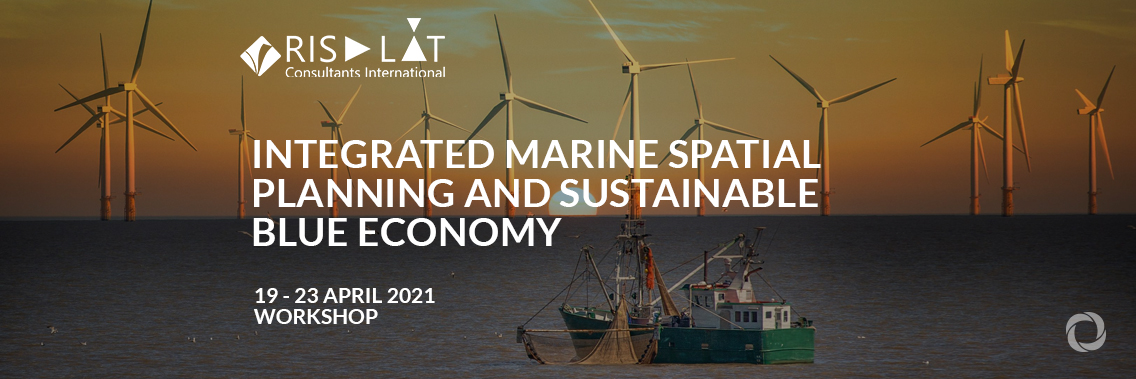? 19 – 23 April 2021
Workshop
Program Overview
Oceans and Seas are the largest ecosystems on our planet. They play a crucial role not only in climate regulation but for the development of the world economy as well. Over 90% of global trade takes place with the help of sea routes, employing millions of people. In the contemporary world, the Blue economy is becoming a more and more significant driver of growth. Its size is expected to grow rapidly in the coming years. However, such an expansion might well put the natural assets of our seas and oceans under unprecedented pressure.
While economic activities related to tourism, ports and shipping, renewable energy production, fishing, aquaculture, and mineral extraction are flourishing, the competition for acquiring and retaining ocean space is becoming fiercer day by day. In the face of this challenge, the need for strategic and integrated efforts for marine planning has become eminent.
Lately, Marine Spatial Planning (MSP) has gained traction as a powerful tool that can lead the way towards a sustainable blue economy. MSP suggests a way for more organized marine space sharing, by integrating social, economic, and environmental uses of the coast and sea. Even though MSP adoption is increasing worldwide, many regions still require support in employing and successfully implementing it.
Strategic Marine Spatial Planning and Sustainable Blue Economy Workshop in Brussels, Belgium is a unique program that has been specifically designed for those professionals who intend to employ MSP for marine conservation, support sustainable blue economy growth, and promote responsible and accountable maritime industry organizations. The program bridges the gap between marine science, management, and spatial planning, and therefore, equips its delegates with unmatched skills and knowledge to embark on new levels in their career.
Target Audience
The program is best suit for:
- Environmental and Sustainability Consultants, Professionals and Policymakers
- Members of national government departments and agencies with coastal or marine responsibilities
- Employees of environmental, nature conservation, and marine NGOs
- Managers and Executive level staff of maritime sector organizations including energy, fisheries, ports and shipping, leisure, and tourism
- Anyone interested in integrated marine spatial planning and sustainable blue economy development.
Program Objectives
Upon the successful completion of this program, participants will be able to:
- Comprehend the need for sustainable marine resource management, as well as the challenges and opportunities of Ecosystem-Based Management
- Demonstrate an in-depth understanding of the IMSP approach and EU Blue growth Policy
- Plan for the collection and mapping of ecological, environmental, and oceanographic conditions information
- Establish an appropriate framework of IMSP, contribute to the overall planning process and assist in developing a guiding vision
- Employ a highly participatory approach while developing Marine Spatial Plans
- Take part in the implementation and enforcement of Marine Spatial plans, as well as become involved in monitoring, evaluation, and compliance processes.
Program Contents
Day 1
- Understanding Sustainable Resource Management
- Challenges and Opportunities for Ecosystem-based Management
- Introduction of Coastal and Marine Resource Management
- Integrated Coastal Zone Management (ICZM)
- Growing and Changing Pressures on Coasts, The drivers of Changes
- From a land-sea to an integrated spatial perspective
- The Integrated Maritime Spatial Planning (IMSP) Approach and EU Blue Growth Policy
- The benefits of IMSP: Can we turn seas into economic powerhouses?
- Main Challenges of IMSP
- Criteria for IMSP Success.
Day 2
- Determining whether IMSP is needed or not
- Establishing Appropriate Authority
- Obtaining Financial Support
- Laying the ground for IMSP
- Collecting and mapping information about ecological, environmental, and oceanographic conditions
- Stocktaking
- Cadaster of Maritime Uses
- Spatial Impact, Conflicts, and Compatibility
- Estimating Potential new demands of Ocean Space
- The importance of regional differentiation
- IMSP as a highly participatory approach.
Day 3
- Establishing Framework of IMSP
- Preparing, Evaluating, and Approving spatial management plan
- Developing Guiding Vision
- Involving and Engaging Stakeholders
- The value of judgments
- Refining mapping and stock take
- Data Collection and Access
- Vulnerability Assessments
- Rating Spatial Impacts
- Cost-Benefit Analysis
- Land-Sea use optimization.
Day 4
- EIA, ESIA, and TIA for large-scale projects
- The role of the law of the sea in IMSP
- The Need for IMSP beyond the areas of national jurisdiction
- Political and Institutional Framework
- Managing Risks through IMSP
- Marine Protected Areas
- Drawing up a plan
- Zoning
- Implementing and Enforcing Spatial Management Plan; Ensuring Compliance
- Spatial Monitoring and Indicators
- Evaluating Performance and Measuring Results
- Adapting and Redesigning Marine Spatial Plans.
Day 5
- Full day Field Trip – Technical Engagements.
Program Methodology
This program is a short-term extensive workshop with a highly practical focus. The presenter will apply modern adult learning techniques in order to maximize the effectiveness of the session delivery and achieve successful results. The methods deployed will include open presentation, group discussions, individual assignments, practical exercises, case studies, and topic-related field visits. At the end of each session, the program experts will request feedback and consider comments received for the coming days in order to improve results and ensure the maximum understanding of the material covered.
Registration Information
Program Name: Integrated Marine Spatial Planning and Sustainable Blue Economy Workshop in Brussels, Belgium
Program Code: MSP021BE
Program Date: 19 – 23 April 2021
Registration Closes on: 28 February 2021
Venue: Hotel Des Colonies
Program Fee: $5880
Fee Covers: Visa Assistance (complementary), Participant Assessment, Airport Pickup, Accommodation, Wi-Fi, Breakfast, Workshop Kit, Interactive workshop, Program Materials, Local Expert, Practical Activities, Lunch, Refreshments, City Map, Field Visit, Certificate & Entertaining Tour.

